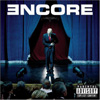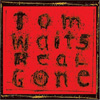




 |
 |
Trick Ponies
This week: Eminem disappoints, Al Jarreau sizzles, and Tom Waits obsesses
Eminem

Encore (Shady/Interscope)
Et tu, Marshall?
In a season of discontent (briefly brightened only by the unlikely triumph of the Red Sox), when the incompetent bullies and spoiled brats have limped again to power on the back of—what, exactly? Bigotry? Fear? Exhaustion? A general national resentment of the world?—the least we could hope for from Eminem is a great cleansing blast of bile. Among the many pleasures of young Mr. Mathers’ first three albums were their spikes of distilled venom, the way he would build himself up and up and up, riding his funny-scary rage through spirals of hairpin rhymes. He’s the most convincingly contemptuous vocalist since Johnny Rotten, and it didn’t hurt that his disgust was global enough to include himself as its primary object.
But that was then. Eminem 2004 is, against what might have seemed like long odds, a more or less well adjusted 30-something adult, a successful producer and label boss, a winner of Grammys and even an Oscar. He can still occasionally work up a head of steam, but he’s clearly confronting the inevitable contradictions of his position. If you make a career out of telling the world to kiss your ass, and the world obeys, then what?
Then you record an album of poop jokes and dick jokes and Michael Jackson put-downs, apparently. Right, it’s as lame as it sounds. The beats still work here and there, but Dr. Dre’s g-funk bounce is past its use-by date. I don’t know if a more ambitious slate of producers would have helped, but it couldn’t have hurt. The basic problem is with Em himself, though—it’s not just that he has nothing to say (apart from the Bush-bashing “Mosh,” which isn’t as good as its searing video), it’s that he rarely sounds interested enough to say it. Even the album’s title signals obligation rather than inspiration. As with other recent events, there’s nothing particularly surprising about the disappointment here. But that doesn’t make it any less disappointing.
Go Sox.
—Jesse Fox Mayshark
Al Jarreau
Accentuate the Positive (Verve)

On Accentuate the Positive’s stunning opener, “Cold Duck,” Al Jarreau busts out. He’s always been infectious, with a supple voice possessed of remarkable range and flexibility, but it’s been decades since he nodded so deliberately in jazz’s direction.
Accentuate the Positive covers diverse ground. While “Cold Duck,” a Jarreau/Eddie Harris original, is all about spit and fire with lyrics to match (“burnin’ so hot melt the snow on the ground”), the title cut is about the funk, with rhythm section dream team Christian McBride/Peter Erskine laying out a solidly seductive pulse and Jarreau riffing on the well-known lyric. More introspective are standards “My Foolish Heart” and “Midnight Sun,” the former delivered with a Latin feel, the latter including a compelling Jarreau exchange with Tollak Ollestad on harmonica.
In addition to his signature vocals, Jarreau also provides lyrics to a number of jazz originals, for example on Parker and Gillespie’s “Groovin’ High” and Dan Grolnick’s “Lotus,” and teams up with pianist and Yelllowjackets co-founder Russell Ferrante on “Scootcha-Booty,” the album’s upbeat closer. Jarreau’s return to mainstream jazz has been a long time coming. We can only hope for more....
—Jonathan B. Frey
Tom Waits

Real Gone (Epitaph)
The arrangements on Real Gone are spare by Tom Waits’ standards—no keyboards, for the first time ever, and generally just guitar, bass, percussion and vocals. But there’s nothing minimalist about the recording. Mark Ribot’s guitar sound is huge, and the rhythm section—Les Claypool and Larry Taylor on bass and Brain banging on everything he could drag into the studio from a junkyard, it sounds like—is almost dementedly propulsive. Add Waits’ craggy voice, a veritable force of nature, and there’s almost no empty space anywhere on the disc.
Where some of Waits’ records from the ’70s sounded like cabaret music performed in a hobo camp, now there’s little of the cabaret left. There are hints of it in the middle, in “Dead and Lovely,” a noir tale of love gone bad, and “Trampled Rose” and “Green Grass,” and “Day After Tomorrow,” a naked country-folk song near the end. But the rest of Real Gone is mad Beefheart blues. On “Baby Gonna Leave Me,” Waits shakes maracas and chants over a tape loop of his own voice, with Ribot laying down a stinging blues guitar.
Waits has always relied on impressionism—his stories are often sketchy, hinging upon details and atmosphere more than narrative. On Real Gone, he seems to have taken that impressionism to extreme ends. Some of it doesn’t work—Waits rapping over his own voice sounds kind of silly. But much of it does, and what works is a welcome update of Waits’ 30-year obsessions.
—Matthew Everett

November 24, 2004 • Vol. 14, No. 48
© 2004 Metro Pulse
|
|